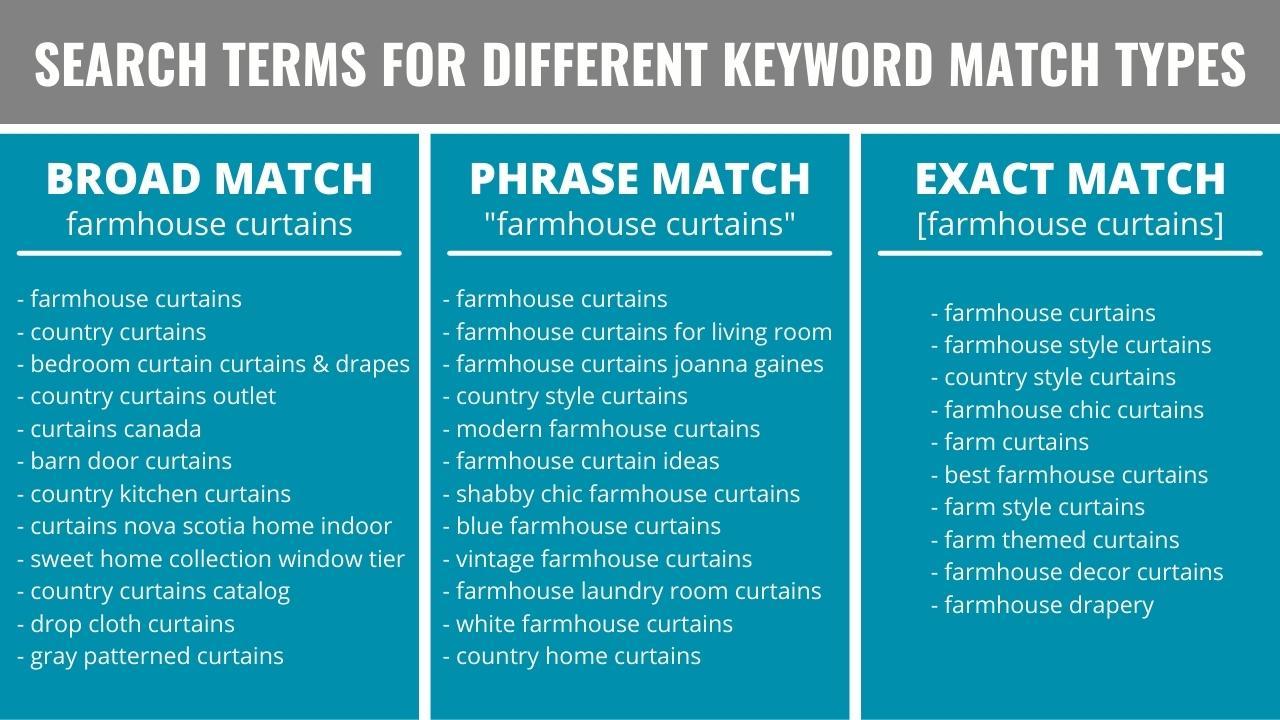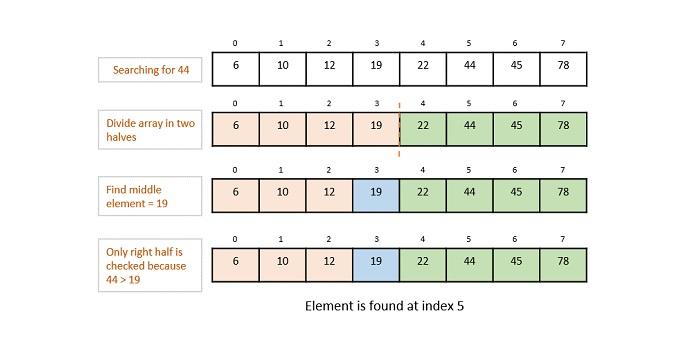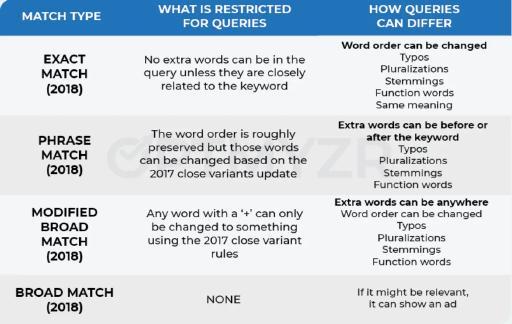In the ever-evolving landscape of digital marketing, the world of pay-per-click (PPC) advertising continues to grapple with the shifting dynamics of keyword strategies.With the rise of machine learning and broad match types,many have questioned the enduring value of exact match keywords. However, as advertisers strive for precision and relevance in an increasingly crowded online marketplace, the exact match keyword type persists as a vital tool in the PPC arsenal. In this article, we delve into the reasons why exact match keywords remain a cornerstone of effective PPC campaigns, exploring their unique advantages and the role they play in navigating the complexities of audience targeting and conversion optimization. Join us as we unpack the relevance of exact match keywords in today’s digital advertising landscape and what they mean for marketers looking to maximize their ROI.
The Enduring Value of Exact Match Keywords in PPC campaigns
In the fast-evolving landscape of pay-per-click advertising, exact match keywords have proven to be a steadfast strategy. Their capacity to narrow down search intent tightly allows advertisers to connect with users who are actively looking for specific products or services. This precision not only enhances the relevance of ads shown to potential customers but also optimizes budget allocation by minimizing wasted impressions. Many advertisers overlook the power of these keywords, yet their effectiveness in driving qualified traffic remains unparalleled. By focusing on exact match keywords, businesses can ensure that their offerings resonate with the most relevant audiences.
Moreover, utilizing exact match keywords can yield significant benefits in terms of ad performance metrics. advertisers can expect higher click-through rates (CTR) and better conversion rates due to the specificity these keywords provide. as competition intensifies,having a clear grasp of customer intent through exact match keywords facilitates a stronger connection between user searches and ad content. Below is a concise comparison of the key advantages:
| Advantage | Description |
|---|---|
| Higher Relevance | directly targets specific search queries |
| Cost Efficiency | Reduces wasted clicks and ad spend |
| Improved Metrics | Drives better CTR and conversion rates |

Understanding User Intent Through Precision Targeting
in the ever-evolving landscape of pay-per-click (PPC) advertising, understanding user intent remains at the forefront of successful campaign strategies. Exact match keywords serve as a direct route to achieving this understanding, allowing advertisers to reach users with pinpoint accuracy. By focusing on specific phrases that align closely with user searches,marketers can ensure that their ads resonate with the right audience. This not only enhances click-through rates but also significantly boosts conversion potential. Key benefits of using exact match keywords include:
- Increased Relevance: Aligns the ad message with user expectations.
- Better Budget Control: Reduces wasted spend on irrelevant clicks.
- Improved Quality Score: Enhances ad ranking and lowers costs.
To maximize the advantages of exact match keywords, it is indeed essential to continually analyse performance data and user behaviors. This allows for the fine-tuning of keyword selections and landing pages, ultimately creating a seamless user experience that drives engagement. By employing a precise targeting approach,advertisers can cultivate deeper insights into consumer motivations,enabling them to craft compelling narratives around their products or services. The following table highlights the impact of precision-targeted campaigns versus broader targeting strategies:
| Strategy Type | Click-Through Rate (%) | Conversion Rate (%) | Cost per Click ($) |
|---|---|---|---|
| Exact Match | 12.5 | 8.3 | 1.25 |
| Phrase Match | 9.8 | 5.7 | 1.50 |
| Broad Match | 6.2 | 2.9 | 1.75 |

navigating the Evolving Landscape of Search Algorithms
In the realm of pay-per-click (PPC) advertising, the exact match keyword type continues to hold significant relevance, even amidst the rapid evolution of search algorithms. Advertisers leverage this type of keyword to improve ad targeting and ensure that their campaigns reach the intended audience. by using exact match keywords, marketers can benefit from:
- Precision: ads are shown only when users search for the exact term, reducing irrelevant clicks.
- Higher Conversion Rates: with better alignment to user intent, the potential for conversions increases.
- Cost Efficiency: By focusing on a narrower audience, ad spend can be more effectively allocated.
Moreover, as algorithms become more sophisticated in understanding user intent and context, the importance of maintaining a foundation in exact match keywords can’t be overlooked. Despite the shift towards broad match types and machine learning models, leveraging exact match provides a sense of control. This balance can be visualized through the following table, highlighting the distinctions between different keyword match types:
| Match Type | Targeting Precision | ad Spend Efficiency | Conversion Potential |
|---|---|---|---|
| Exact Match | High | High | Very High |
| Phrase Match | Medium | Medium | high |
| Broad Match | Low | Low | Medium |
By strategically incorporating exact match keywords into a larger campaign strategy, advertisers can effectively navigate the intricacies of PPC competition. As the landscape of digital advertising continues to shift, finding the right balance between exact match and more flexible keyword types will be crucial for sustaining long-term success.

Best Practices for Leveraging Exact Match Keywords Today
To maximize the effectiveness of exact match keywords in your PPC campaigns, it’s essential to refine your targeting strategies. Focus on high-intent keywords that are relevant to your audience.This involves conducting careful keyword research to identify terms that not only fit your niche but also have a strong potential for conversions. Consider the following approaches:
- Utilize tools like Google Keyword Planner and SEMrush to gauge search volume and competition.
- Analyze competitor strategies to discover keywords they are successfully targeting.
- Incorporate long-tail variations of your exact match keywords to capture niche audiences looking for specific products or services.
Moreover,it’s crucial to continuously monitor and optimize your campaigns. Regularly review performance metrics to determine what works best for your ads. apply A/B testing on variations of your ad copy and landing pages to find the most effective combination. Consider creating a simple table to track your findings:
| Keyword | Click-Through Rate | Conversion Rate |
|---|---|---|
| Exact Match Keyword A | 2.5% | 5.4% |
| Exact Match Keyword B | 3.0% | 4.8% |
| Exact Match Keyword C | 1.8% | 6.0% |
By keeping a close eye on these metrics, you can make data-driven decisions that enhance the performance of your exact match keywords, ultimately leading to greater success in your PPC efforts.
Concluding Remarks
In an ever-evolving digital landscape, the strategies that drive successful PPC campaigns must adapt to emerging trends and user behaviors. Yet, amidst this constant change, the exact match keyword type stands resilient, holding its ground as a vital tool for advertisers aiming to maximize precision and relevancy. As we’ve explored, its ability to deliver targeted traffic and enhance ad performance illustrates why it should not be overlooked in the modern marketer’s arsenal.
As we move forward into an era defined by automation and AI-driven solutions, the fundamental principles of understanding customer intent and delivering highly relevant ads remain as crucial as ever. Embracing the exact match keyword approach can definitely help businesses navigate these complexities, ensuring they remain anchored in their target audience’s needs.
while innovation continues to shape the future of PPC, the enduring relevance of exact match keywords reminds us that, sometimes, the simplest tools can yield the most impactful results. As we refine our strategies, let’s not forget the power of precision—one exact match at a time.